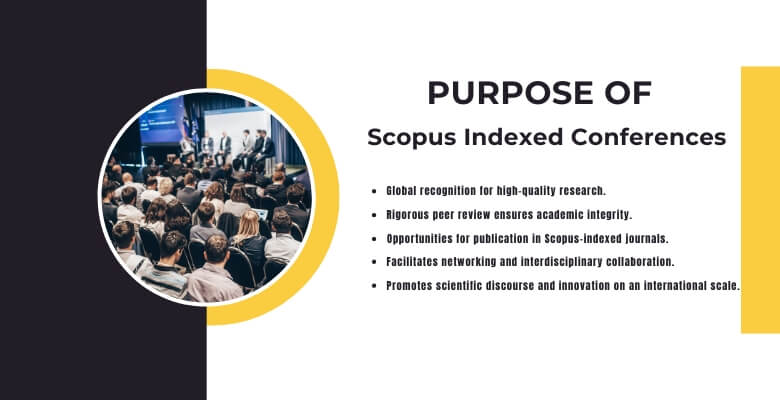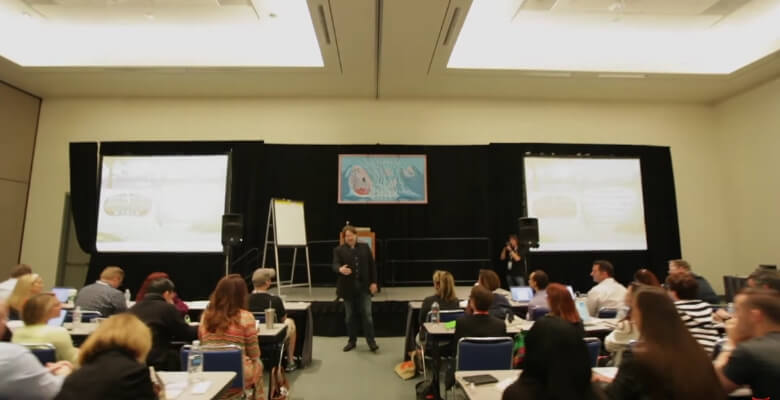Scopus indexed conferences are prestigious academic events recognized for rigorous peer review and high standards. These conferences provide an excellent platform for researchers to present their work and network with their peers. So, how to find upcoming Scopus Indexed conferences?
You can find upcoming Scopus Indexed conferences by visiting organizer’s websites, using social media platforms that are also valuable for real-time updates, checking university notice boards or websites, subscribing to industry newsletters, and reading relevant journals for announcements and updates.
By following these steps, you’ll be well-informed about the latest opportunities. Read on for more detailed strategies to stay ahead in your academic and professional journey.
Core Purpose of Scopus Indexed Conferences
Scopus indexed conferences serve as a vital platform for researchers to share their latest findings with a global audience. These conferences bring together experts from diverse fields, fostering collaboration and innovation. Attending allows participants to stay updated on the latest trends and developments. It’s a space where ideas are exchanged, and knowledge is advanced.

For researchers and academics, upcoming Scopus indexed conferences offer the opportunity to present their research to an international community. This exposure can lead to valuable feedback and potential collaborations. Researchers can also gain recognition within their field, enhancing their academic and professional growth. These conferences are crucial for those looking to make an impact.
Moreover, Scopus indexed conferences help institutions and organizations maintain their research standards. By participating, they ensure their work meets global academic benchmarks. This alignment with Scopus standards is essential for credibility and visibility. It’s an investment in the future of research and innovation.
How to Find Upcoming Scopus Indexed Conferences?
Finding upcoming Scopus indexed conferences can significantly increase your professional development. These events offer invaluable opportunities for networking, collaboration, and staying updated on the latest research. Here’s a step-by-step guide to help you locate them effectively.
Method 1: Visit Organizer Websites
Start by visiting the websites of reputable conference organizers like Global Conference Alliance Inc. to find upcoming Scopus indexed conferences. These sites often list detailed information about upcoming events, including dates, locations, and submission deadlines.
Method 2: Utilize Social Media Platforms for Real-Time Updates
Social media platforms are invaluable for staying updated on upcoming Scopus indexed conferences. Follow relevant accounts, join professional groups, and monitor hashtags to receive timely notifications and engage with other attendees and organizers.
Method 3: Check University Notice Boards and Websites
University notice boards and websites frequently post announcements about upcoming Scopus indexed conferences. These academic institutions often host or collaborate on such events, making them reliable sources for the latest conference information.
Method 4: Subscribe to Industry Newsletters
Subscribing to industry newsletters is an effective way to stay informed about upcoming Scopus indexed conferences. These newsletters often highlight important events, providing subscribers with regular updates and insights into various academic and professional gatherings.
Method 5: Read Relevant Journals for Announcements and Updates
Relevant academic and professional journals often publish announcements about upcoming Scopus indexed conferences. By regularly reading these journals, you can stay informed about significant events and important deadlines in your field of interest.
Can You Publish Your Paper at a Scopus Indexed Conference?
Yes, you can publish your paper at a Scopus indexed conference. These conferences provide an excellent platform for researchers to share their work with a broad audience. By presenting your paper, you gain valuable exposure and feedback. It also enhances your academic profile and helps you connect with other professionals.
You can start by searching for events in your field of study to find upcoming conference for paper publication. Attending these conferences increases your chances of getting published in Scopus-indexed journals. You should prepare your paper according to the conference guidelines for better results. Participating in these events is a valuable step in advancing your research career.
Who Should Attend the Scopus Indexed Conferences?
Scopus indexed conferences are prestigious events that bring together a diverse group of professionals. Attending these conferences can provide significant benefits, from networking to gaining insights into the latest research. Here are seven types of professionals who should consider attending.
- Researchers and Academics: Scopus Indexed conferences can provide valuable feedback and recognition. Networking with peers can lead to collaborations and future research.
- Graduate and PhD Students: These conferences offer an excellent platform for students to showcase their work and gain exposure. Additionally, they can learn from experienced researchers.
- Industry Professionals: Industry experts benefit from attending Scopus Indexed conferences. Academic collaboration can also lead to practical applications.
- University Faculty Members: Faculty members can benefit by staying current with advancements in their academic disciplines. Furthermore, these events offer opportunities to recruit talented students and establish academic partnerships.
- Policy Makers and Government Officials: Attending will help them understand the latest scientific developments. They can also network with experts to inform evidence-based policymaking.
- Journal Editors and Publishers: Conferences provide a venue to discover new research trends. Collaborations and editorial networks can also be improved by meeting authors and researchers.
- Students and Early-Career Researchers: Early-career professionals can learn from established experts at these conferences. Furthermore, presenting their work can boost their confidence.
Benefits of Attending Scopus Indexed Conferences
Attending Scopus indexed conferences can significantly increase your professional growth. These conferences provide a platform for sharing innovative research, networking with experts, and staying updated on the latest developments. Here are the key benefits of participating in these prestigious events.
Networking Opportunities
Scopus indexed conferences offer excellent networking opportunities. You can connect with experts, peers, and potential collaborators from around the world. These interactions can lead to valuable partnerships and future research projects. Expanding your professional network is crucial for career advancement.
Access to Innovative Research
Attendees gain access to the latest research and technological advancements. Presentations and sessions cover a wide range of topics relevant to various fields. This exposure helps you stay updated on trends and developments. Keeping informed is essential for maintaining a competitive edge.
Increased Visibility and Recognition
Presenting at Scopus indexed conferences increases your visibility in the academic community. Sharing your research with a broad audience increases recognition and credibility. This can lead to more citations and opportunities. Building your reputation is key to professional success.
Professional Development
Participating in these conferences contributes to your professional development. You can attend workshops and sessions that increase your skills and knowledge. These learning experiences are invaluable for personal growth. Investing in your development is vital for long-term success.
Collaboration Opportunities
Scopus indexed conferences are ideal for finding collaborators for research projects. Meeting like-minded professionals can lead to joint research and publications. Collaborative efforts often result in more impactful research. Working with others improves your research quality and reach.
Exposure to Diverse Perspectives
Conferences attract participants from various backgrounds and disciplines. This diversity brings a range of perspectives to discussions and presentations. Engaging with different viewpoints broadens your understanding. Adopting diversity enriches your professional and personal growth.
Career Advancement
Attending these conferences can significantly impact your career trajectory. The knowledge and connections gained can open doors to new opportunities. Employers value the experience and insights gained from conference participation. Improving your resume with conference experiences boosts your career prospects.
Tips for Making the Most of Your Scopus Indexed Conference Experience
Attending a Scopus-indexed conference can be a remarkable experience. Once you select the right conference to attend, plan and engage actively to maximize the benefits. Here are some tips to help you make the most of your conference experience.
Plan Ahead
Before the conference, review the agenda and identify key sessions. Planning ahead ensures you don’t miss important presentations. Make a schedule that includes sessions, networking events, and breaks. Being organized helps you manage your time effectively.
Engage Actively
Participate actively in sessions by asking questions and contributing to discussions. Engaging with speakers and attendees improves your learning experience. Take advantage of Q&A sessions to clarify doubts. Active participation leaves a positive impression on others.
Network Strategically
Identify key individuals you want to connect with before the conference. Networking strategically can lead to valuable collaborations and opportunities. Approach speakers and attendees during breaks and networking events. Building relationships is crucial for long-term professional growth.
Take Effective Notes
Effective note-taking during sessions is essential for retaining information. Use note-taking tips during a conference to capture key points and insights. Organize your notes by session and highlight important takeaways. Reviewing your notes later helps reinforce learning.
Follow Up Post-Conference
After the conference, follow up with the contacts you made. Send personalized emails or connect on professional networks like LinkedIn. Following up strengthens your new connections. This can lead to future collaborations and opportunities.
Reflect and Apply
Reflect on what you learned and how it applies to your work. Identify key takeaways and consider how to implement them. Applying new knowledge improves your professional practice. Reflection ensures you derive lasting benefits from the conference.
If you want to get the most out of your Scopus indexed conference experience, prepare your presentation thoroughly and network with key industry professionals beforehand. You should remember that it is also critical to select the conference that is aligned with your research goals and gain valuable insights.
FAQs for How to Find Upcoming Scopus Indexed Conferences?
You can significantly improve your professional development by finding upcoming Scopus Indexed conferences. Here are some frequently asked questions and their answers to help you understand the process effectively.
How Can Social Media Help in Finding Conferences?
Social media platforms are invaluable for staying updated on upcoming Scopus indexed conferences. Following relevant accounts and joining professional groups can provide timely notifications. Monitoring hashtags related to your field helps you engage with other attendees and organizers.
Why Should I Subscribe to Industry Newsletters?
Subscribing to industry newsletters is an effective way to stay informed about upcoming Scopus indexed conferences. These newsletters highlight important events and provide regular updates. They offer insights into various academic and professional gatherings.
How Do Academic Journals Announce Conferences?
Relevant academic and professional journals often publish announcements about upcoming Scopus indexed conferences. Regularly reading these journals keeps you informed about significant events and deadlines. Journals are a reliable source of conference information.
Can Networking Help Me Find Conferences?
Networking with colleagues and peers can help you discover upcoming Scopus indexed conferences. Many professionals share information about conferences they plan to attend. Engaging in academic and professional communities increases your chances of finding relevant events.
How Important is It to Plan Ahead for Conferences?
Planning ahead is crucial for making the most of Scopus indexed conferences. Reviewing the agenda and identifying key sessions ensures you don’t miss important presentations. Being organized helps you manage your time effectively and maximize your experience.
Bottom Line
Professionals and academics alike can benefit from attending Scopus-indexed conferences. From networking opportunities to access to the latest research, these events are essential for staying ahead in your field. Engaging actively and strategically can significantly increase your conference experience.
The benefits go beyond learning; they include visibility, professional development, and collaboration. These conferences attract diverse participants, providing exposure to various perspectives and ideas. Knowing how to find upcoming Scopus indexed conferences can ensure you never miss these valuable opportunities.
Reflecting on the knowledge and connections gained from these conferences can lead to significant career advancements. Following up with new contacts and applying new insights to your work are crucial steps. Attending and making the most of these events can profoundly impact your professional growth and success.







